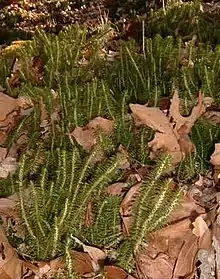Huperzia lucidula
Huperzia lucidula, the shining firmoss or shining clubmoss, is a bright evergreen, rhizomatous clubmoss of the genus Huperzia.
| Shining firmoss | |
|---|---|
 | |
| Scientific classification | |
| Kingdom: | Plantae |
| Clade: | Tracheophytes |
| Clade: | Lycophytes |
| Class: | Lycopodiopsida |
| Order: | Lycopodiales |
| Family: | Lycopodiaceae |
| Genus: | Huperzia |
| Species: | H. lucidula |
| Binomial name | |
| Huperzia lucidula (Michaux) Trevisan | |
| Synonyms | |
|
Lycopodium lucidulum Michx. | |
They grow in loose tufts 14–20 cm long, occasionally up to 1 m long. The leaves are 7–11 mm long (shorter, 3–6 mm, at annual nodes), narrow, lance-shaped, shiny, and evergreen. The edges are irregularly toothed. The sporangia (spore cases) are nestled in the bases of the upper leaves.
The roots of this plant grow from a creeping, branching, underground rhizome.
The Shining firmoss ranges in Canada from Manitoba to Newfoundland, and south into the United States to Missouri and the Carolinas. Its habitat includes rich, acid soils in cool, moist coniferous and mixed hardwood forests, bog and stream edges, and hillsides. They occasionally grow on cliffs and ledges and on shady, mossy, acidic sandstone.
The specific name lucidula comes from the Latin and means "shining". This is in reference to the plants bright, vivid green color.


